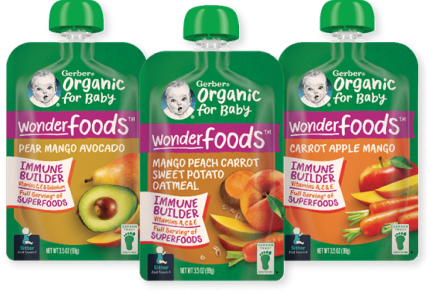How Nutrition Helps Support the Immune System of Infants and Toddlers
5 min read • By: Gerber Medical Hub

Quick Summary
In this article, we will explore the role of nutrition in supporting the development of the immune system of infants and toddlers, which nutrients play a role in immunity, and the key practices to supporting an immune system.
Table of contents
Key Nutrients Supporting a Healthy Immune System
The Role of Nutrition in the Immune System
In the early stages of life, a child's immune system is still developing and vulnerable to various illnesses and infections. As parents, caregivers, and healthcare providers, it is crucial to understand the significant impact that nutrition plays in supporting a healthy immune system for infants and young children. From breastfeeding to introducing solid foods, the choices made regarding diet can have long-lasting effects on the ability to fight off diseases and promote overall well-being (Hörnell 2013, Kuo 2011).
In this article, we will explore the vital role of nutrition in supporting the development of the immune system of infants and toddlers, which nutrients play a role in immunity, and the key practices to support the immune system.
Key Nutrients That Support a Healthy Immune System
Below are key nutrients that support a healthy immune system, including how they provide support, specific foods and where they are found, and the Recommended Dietary Allowances (RDAs):
Vitamin A
Immune-related function
- Acts as an important antioxidant to the cells of the immune system (NIH 2023).
- Regulates immune cell response and provides mechanistic defense (Guruz 2022, Huang 2018, Mora 2008).
Food source examples
Yellow, orange, and red fruits and vegetables such as Gerber baby food fruit (mango) and vegetable (butternut squash, pumpkin, sweet potato) purees
RDA for infants 7-12 months: 500 mcg
RDA for infants 1-3 years: 300 mcg
Vitamin C
Immune-related function
- Acts as an important antioxidant to the cells of the immune system (Moore 2023).
- Supports various cellular functions of both the innate and adaptive immune systems (Carr 2017).
- Improves the absorption of nonheme iron, the form of iron present in plant-based foods (NIH 2021).
- Aids vitamin E and selenium against potentially harmful oxidations (NRC 1989).
Food source examples
- Gerber baby food fruit purees fortified with vitamin C
- Gerber infant cereals fortified with vitamin C
- Other fruits and veg like strawberries, cantaloupe, citrus, peppers
RDA for infants 7-12 months: 50 mcg
RDA for infants 1-3 years: 15 mcg
Vitamin D
Immune-related function
- Important regulator of the immune system (Aranow 2011, Martens 2020).
- Regulates antimicrobial protein levels and may be crucial in infection control (Prietl 2013).
Food source examples
Gerber Yogurt Blends, Fortified yogurt, Fortified milk
RDA for infants 7-12 months: 10 mcg
RDA for infants 1-3 years: 15 mcg
Vitamin E
Immune-related function
- Acts as an important antioxidant to the cells of the immune system (Lewis 2019).
- Primary defense against potentially harmful oxidations (NRC 1989).
- Improves resistance to infections (Lee 2018).
Food source examples
Cooking oils, developmentally appropriate nuts and seeds, avocados
RDA for infants 7-12 months: 5 mcg
RDA for infants 1-3 years: 6 mcg
Selenium
Immune-related function
- Essential for optimal functioning of cells comprising both adaptive and innate immunity (IOM 2000).
- Protects from oxidative damage and infection (NIH 2021).
- Aids vitamins C and E against potentially harmful oxidations (NRC 1989).
Food source examples
Fish, enriched whole grains, beef, turkey, chicken, eggs
RDA for infants 7-12 months: 20 mcg
RDA for infants 1-3 years: 20 mcg
Iron
Immune-related function
- Essential mineral for both first and secondary immune response (Cronin 2019, Haschka 2021).
- Necessary for immune cell proliferation and maturation, particularly lymphocytes, associated with the generation of a specific response to infection (Hassan 2016, Nairz 2020, Soyano 1999).
Food source examples
Gerber iron-fortified infant cereals, Gerber 2nd Foods Meat & Poultry Purees, beef, legumes
RDA for infants 7-12 months: 11 mcg
RDA for infants 1-3 years: 7 mcg
Zinc
Immune-related function
- Crucial for normal development and function of cells mediating innate immunity, neutrophils, and NK cells (Prasad 2008).
- Ability to function as an antioxidant (Prasad 2008).
Food source examples
Gerber 2nd Foods Meat & Poultry Purees
RDA for infants 7-12 months: 3 mcg
RDA for infants 1-3 years: 3 mcg
Probiotics
Immune-related function
- Regulate host innate and adaptive immune responses (Mazziotta 2023, Yan 2014).
- Increase in specific antibody production (Galdeano 2019).
Food source examples
Gerber infant cereals with probiotics, yogurt with live and active probiotic cultures
RDA for infants 7-12 months: N/A
RDA for infants 1-3 years: N/A
Key Practices to Support a Healthy Immune System
Helping support a healthy immune system in childhood includes being adequately nourished, especially with the above key nutrients. In addition, here are some key practices to consider:
Consume a Variety of Foods
Provide a well-rounded diet that includes a variety of colorful fruits, vegetables, whole grains such as iron-fortified infant cereals, lean proteins, and healthy fats. This ensures that children receive essential vitamins, minerals, and antioxidants necessary for a robust immune system.
Limit Added Sugars
Excessive sugar intake can suppress the immune system. Minimize sugary drinks and desserts and opt for healthier alternatives like fruit.
Ensure Proper Hydration
Staying well-hydrated supports overall health, including immune function. Encourage your child to drink water throughout the day and limit sugary beverages.
Encourage Food, and Supplement Only When Recommended
- Most supplements used by children are not under the recommendation of a health care provider. The most common reasons for use of supplements in children are for health promotion, yet little scientific data support this notion in children that are consuming a nutritionally adequate diet (Bailey 2013).
- From the Feeding Infants and Toddlers Study (FITS) 2016 (Bailey 2018), dietary supplement use was 15-23% among infants (up to 11.9 mo) and toddlers (12-23.9 mo) and 35-45% among preschoolers (24-36.9 mo). Excess retinol, zinc, and folic acid was noted across most ages, especially among supplement users.
- According to the AAP (2022), vitamin D supplementation is recommended for 0-12-month-old infants and 1-12-year-old children for a total of 10mcg/day and 15mcg/day, respectively, including from food and beverage sources.
- In general, healthy children receiving a well-balanced diet do not need vitamin, mineral, nor probiotic supplementation, especially not over and above the Daily Value of each nutrient as these can cause adverse health effects ranging from nausea to rashes to headaches (AAP 2022, Johnstone 2023).
- It is recommended that parents talk with their pediatrician before giving vitamin supplements to their child(ren) (Johnstone 2023).
- Families could also work with Registered Dietitian Nutritionists to determine how the child’s current diet provides nutrients.
References
Aranow C. Vitamin D and the immune system. J Investig Med. 2011 Aug;59(6):881-6.
Carr AC, Maggini S. Vitamin C and Immune Function. Nutrients. 2017 Nov 3;9(11):1211.
Lee GY, Han SN. The Role of Vitamin E in Immunity. Nutrients. 2018 Nov 1;10(11):1614.
Yan F, Polk DB. Probiotics and immune health. Curr Opin Gastroenterol. 2011 Oct;27(6):496-501.

Check out the Immune Builder Pouches that provide a blend of nature’s nutrient dense super foods plus vitamins A, C, and E to support the developing immune system
